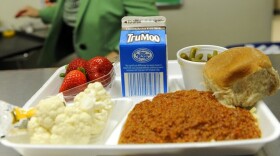-
The federal judge wrote that he is “not persuaded that Florida will suffer irreparable damage without a stay," but that noncompliance can bring substantial harm to institutionalized children.
-
It's been over a decade since whole milk through the National School Lunch Program was effectively banned. Dairy farmers, some health experts and members of Congress say it’s time to bring it back.
-
Language has always evolved, and new words have always popped up. In this case, words were created within a digital setting to evade rules and are permeating spoken language, especially among youths.
-
Splash pad visits might provide some relief from sweltering heat, but they could also be exposing children to bacteria that could make them sick.
-
The cases are mostly linked to international travel. And because Florida is a major tourism and travel hub, health officials are imploring adults to ensure their kids receive the two-dose vaccination.
-
The law expands subsidized insurance coverage for families of four with incomes up to 300 percent of the federal poverty level, or about $90,000 annually.
-
The homicide rate for older teens rose to its highest point in nearly 25 years during the COVID pandemic, and the suicide rate for adults in their early 20s was the worst in more than 50 years, researchers say.
-
A judge says a House panel “has shown a legitimate interest" in obtaining the state American Academy of Pediatrics' documents on the development of care standards for minors diagnosed with gender dysphoria.
-
The House voted 82-31 to OK the measure, which would largely put into law rules approved by the state medical boards. While the Senate has approved the bill, the House made changes, meaning it will have to go back to the Senate for a final vote.
-
The bipartisan measure was approved in the House, 105-0. KidCare provides health insurance for families with incomes too high to qualify for Medicaid.
-
A study published in the journal Pediatrics suggests COVID-19 caused severe brain damage in two babies born in Miami.
-
This is the first time researchers have achieved such encouraging results in solid tumors, but it is too soon to call it a cure for neuroblastoma, a nerve tissue cancer that often starts in infancy.
Play Live Radio
Next Up:
0:00
0:00
Available On Air Stations











